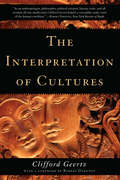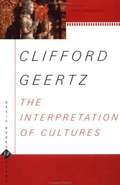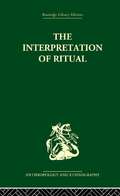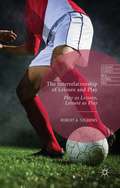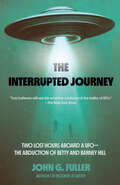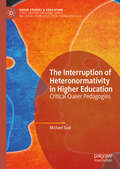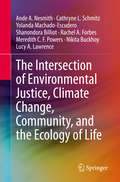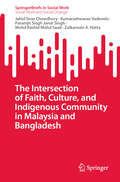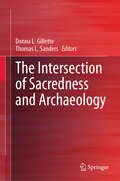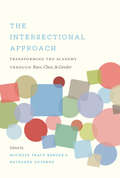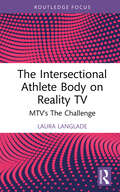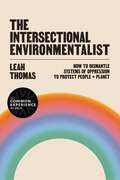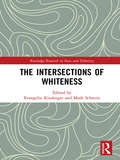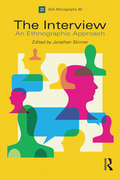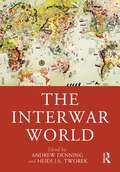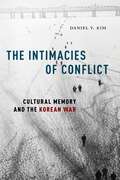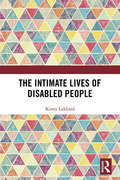- Table View
- List View
The Interpretation of Cultures
by Clifford Geertz Robert DarntonIn The Interpretation of Cultures, the most original anthropologist of his generation moved far beyond the traditional confines of his discipline to develop an important new concept of culture. This groundbreaking book, winner of the 1974 Sorokin Award of the American Sociological Association, helped define for an entire generation of anthropologists what their field is ultimately about.
The Interpretation of Cultures: Selected Essays
by Clifford GeertzIn The Interpretation of Cultures, the most original anthropologist of his generation moved far beyond the traditional confines of his discipline to develop an important new concept of culture. This groundbreaking book, winner of the 1974 Sorokin Award of the American Sociological Association, helped define for an entire generation of anthropologists what their field is ultimately about.
The Interpretation of Fairy Tales: Revised Edition
by Marie-Louise von FranzOf the various types of mythological literature, fairy tales are the simplest and purest expressions of the collective unconscious and thus offer the clearest understanding of the basic patterns of the human psyche. Every people or nation has its own way of experiencing this psychic reality, and so a study of the world's fairy tales yields a wealth of insights into the archetypal experiences of humankind.Perhaps the foremost authority on the psychological interpretation of fairy tales is Marie-Louise von Franz. In this book—originally published as An Introduction to the Interpretation of Fairy Tales —she describes the steps involved in analyzing and illustrates them with a variety of European tales, from "Beauty and the Beast" to "The Robber Bridegroom."Dr. von Franz begins with a history of the study of fairy tales and the various theories of interpretation. By way of illustration she presents a detailed examination of a simple Grimm's tale, "The Three Feathers," followed by a comprehensive discussion of motifs related to Jung's concept of the shadow, the anima, and the animus. This revised edition has been corrected and updated by the author.
The Interpretation of Ritual
by J S La FontaineFirst published in 1972. A revival of interest in primitive religion has been one of the most marked characteristics of British social anthropology of recent years. Inspired by the work of Audrey Richards, whose writing on ritual contains many of the insights that have been developed in later studies, this volume uses material drawn from all over Africa and Polynesia. The contributors include: Raymond Firth, Esther Goody, Aidan Southall, R.G. Abrahams, Edwin Ardener, J.S. La Fontaine, Monica Wilson, Elizabeth Bott, Edmund Leach and P.H. Gulliver.
The Interrelationship of Leisure and Play: Play As Leisure, Leisure As Play (Leisure Studies in a Global Era)
by Robert StebbinsIn the scientific studies of play and leisure there has been an unfortunate tendency for the enthusiasts of one to ignore the contributions made by their colleagues in the other. This book shows what the two fields have been missing because of this isolation. The new idea of augmentative play enables us to examine how and where play and leisure are often vitally dependent on each other. Augmentative play is a special activity that aids substantially the pursuit of a larger, encompassing leisure activity. This approach to the study of play is unique. It recognizes the hundreds of activities in which play and leisure come together, sometimes to produce deeply fulfilling experiences and outcomes for participants, other times to produce more fleeting enjoyment for them.
The Interrupted Journey: Two Lost Hours Aboard a UFO: The Abduction of Betty and Barney Hill (The\interrupted Journey Ser.)
by John FullerTWO LOST HOURS ABOARD A UFO—THE ABDUCTION OF BETTY AND BARNEY HILL • One of the most extraordinary UFO tales of our time—a thrilling, otherworldly, and wildly entertaining adventure that enraptured America and stands as the quintessential extraterrestrial encounter"True believers will see this as further evidence of the reality of UFOs" —The New York Times On a summer night in 1961, Betty and Barney Hill were driving home through New Hampshire when a bright object appeared in the sky and began following them. When the couple finally pulled over to get a better look, the object vanished before their eyes. With nothing else to do, Betty and Barney returned to their car and kept driving into the night. The encounter left them rattled, but what came next was even more arresting: the following day, the Hills realized they couldn&’t remember anything from almost two hours of their drive. Time itself had disappeared, so the couple began looking for help, hoping to uncover what happened that mysterious night. Captivating and unputdownable, The Interrupted Journey is the complete story of those missing hours and the Hills&’ nearly identical accounts, as revealed to doctors under psychotherapy and hypnosis. It stands as one of the most extraordinary UFO tales of our time. Thrilling, otherworldly, and wildly entertaining, The Interrupted Journey is an adventure that enraptured America and stands as the quintessential extraterrestrial encounter.
The Interruption of Heteronormativity in Higher Education: Critical Queer Pedagogies (Queer Studies and Education)
by Michael SealThis book examines how heteronormativity in higher education can be interrupted and resisted. Located within the theoretical framework of queer and critical pedagogy and based on extensive empirical research, the author explores the dynamics of heteronormativity and its interruption on professional courses in a range of higher education institutions. Reactions to attempt to interrupt it were nuanced: while strategies of contested engagement, avoidance and retreat were expressed, heterosexualities were largely un-examined and un-articulated. ‘Coming out’ needs to be a pedagogical act, carried out concurrently with the interruptions of other social constructions and binary oppositions. The author calls for co-created and co-held meta-reflexive and liminal spaces that emphasise inter-subjectivity, encounters, and working in the moment. These spaces must de-construct and reconstruct pedagogical power and knowledge to promote collective intersubjective consciousnesses, and widen the vision of the reflective practitioner to that of the pedagogical practitioner. This pioneering book is a call to action to all those concerned with interrupting and problematising presumed binary categories of sexuality within the heterosexual matrix.
The Intersection of Environmental Justice, Climate Change, Community, and the Ecology of Life
by Cathryne L. Schmitz Ande A. Nesmith Yolanda Machado-Escudero Shanondora Billiot Rachel A. Forbes Meredith C. Powers Nikita Buckhoy Lucy A. LawrenceThis book examines and encourages the increasing involvement of those in the social sciences, including social work, as well as everyday citizens, with environmental injustices that affect the natural ecology, community health, and physical and mental health of marginalized communities. The authors draw on their diverse experiences in research, practice, and education to suggest interdisciplinary strategies for addressing environmental justice, climate change, and ecological destruction on both a local and global scale. This insightful work presents models for action, practice, and education, including field learning, with examples of how programs and schools have integrated and infused environmental justice content across their curricula. Environmental and ecological impacts on local communities as well as the whole ecology of life are examined. Models for engaging civic dialogue, addressing structural oppression, and employing other interdisciplinary responses to environmental injustices are provided.Topics explored among the chapters include:Water, Air, and Land: The Foundation for Life, Food, and SocietyHuman Health and Well-Being in Times of Global Environmental Crisis Power and Politics: Protection, Rebuilding, and JusticePathways to Change: Community and Environmental TransformationDecolonizing Nature: The Potential of Nature to HealThe Intersection of Environmental Justice, Climate Change, Community, and the Ecology of Life equips readers to identify the impact of the global environmental crisis in their own communities. Emphasizing the need for immediate action on ecological, climate, and environmental justice issues, this forward-thinking book assists social science professionals, educators, researchers, and other concerned individuals with the knowledge needed for creating meaningful interdisciplinary responses in their communities as they take action within a rapidly changing context.
The Intersection of Faith, Culture, and Indigenous Community in Malaysia and Bangladesh (SpringerBriefs in Social Work)
by Jahid Siraz Chowdhury Mohd Rashid Mohd Saad Kumarashwaran Vadevelu Paramjit Singh Jamir Singh Zulkarnain A. HattaThis book is a comprehensive study of the intersection of religion, Indigenous culture, and community life, featuring an in-depth examination of the Orang Asli in Malaysia and the Santals in Bangladesh that aims for a socially inclusive, harmonious, and peaceful society. It dives into the impact of conversion on Indigenous identities, employing extensive ethnographic and phenomenological methodologies. The authors explore the conversion process attentively, revealing hidden isolation. This compact volume offers intriguing insights into Southeast and South Asia's rich tapestry, including nuance to discussions concerning religious pluralism, human rights, and the pursuit of social justice. Readers gain a better understanding of varied religious communities and Indigenous perspectives in order to promote a more inclusive and fair society. In the book, the authors provide real-life experiences, extensive analysis, and practical solutions for Indigenous populations in Malaysia and Bangladesh. They blend together thoughts and narratives, encompassing sociopolitical and historical themes. With visuals, case studies, and varied views, the volume builds respect for global variety while driving societal inclusion with the spirit of the sustainable development goals (SDGs). The Intersection of Faith, Culture, and Indigenous Community in Malaysia and Bangladesh addresses pressing social justice and human rights issues, pushing for rights-based society and diversity, while balancing academic rigor and accessibility. The book is intended for scholars and researchers interested in Indigenous peoples, religious conversion, social justice, and human rights. It offers detailed insights into the conversion experiences of Malaysian Orang Asli and Bangladeshi Santal groups, and provides commentary on civil freedoms following conversion and reveals complex views of these communities, making the volume useful for scholars researching intersectionality in religious conversions and the dynamics surrounding Indigenous populations. Policymakers in Malaysia, Bangladesh, and other Asian countries dealing with comparable concerns with converted Indigenous people might benefit from the book's evidence-based insights and challenges, promoting more inclusive and culturally sensitive policies and urging Malaysian and Bangladeshi governments to recognize conversion-related issues.
The Intersection of Sacredness and Archaeology
by Donna L. Gillette Thomas L. SandersAt the point of the often-contentious intersection of sacred site preservation and resource development, archaeology has a unique and valuable role. Archaeology has been criticized as a destroyer of sacred sites through the unbridled pursuit of knowledge through excavation or aiding unbridled development by failing to identify sacred sites. However, archaeology can act as a mitigator between the conflicting goals of preservation and development, while giving the indigenous a voice. At the heart of this mitigation is understanding the sacred: how it might be physically manifested, how those of diverse cultures understand it, and how it is effected by the laws and norms of diverse cultures. The purpose of this book is to enhance the discussion surrounding contemporary human interaction with our natural and cultural landscape. Its first goal is make this discussion more productive and less contentious by presenting and thus recognizing the cultural ways of knowing and perspectives of indigenous people. Its second goal is to foster the preservation of our scared landscape. As more and more of our physical landscape is being altered worldwide through rapid growth and development, the cultural landscape is also being changed and challenged. These changes often reflect the interests of some members of society, while the interests of others, including those of Native and Indigenous communities and many archaeologists, environmentalists and others who understand the importance of knowing the past, are disregarded. The latter group is dedicated toward preserving special places, and continuing to provide for Native people the ability to celebrate their traditions and focusing on defining the sacred landscape.
The Intersectional Approach: Transforming the Academy through Race, Class, and Gender
by Michele Tracy BergerIntersectionality, or the consideration of race, class, and gender, is one of the prominent contemporary theoretical contributions made by scholars in the field of women's studies that now broadly extends across the humanities, social sciences, and natural sciences. Taking stock of this transformative paradigm,The Intersectional Approachguides new and established researchers to engage in a critical reflection about the broad adoption of intersectionality that constitutes what the editors call a new "social literacy" for scholars. In eighteen essays, contributors examine various topics of interest to students and researchers from a feminist perspective as well as through their respective disciplines, looking specifically at gender inequalities related to globalization, health, motherhood, sexuality, body image, and aging. Together, these essays provide a critical overview of the paradigm, highlight new theoretical and methodological advances, and make a strong case for the continued use of the intersectional approach both within the borders of women's and gender studies and beyond. Contributors: Lidia Anchisi, Gettysburg College Naomi Andre, University of Michigan Jean Ait Belkhir, Southern University at New Orleans Michele Tracy Berger, University of North Carolina at Chapel Hill Kia Lilly Caldwell, University of North Carolina at Chapel Hill Elizabeth R. Cole, University of Michigan Kimberle Crenshaw, University of California, Los Angeles Bonnie Thornton Dill, University of Maryland Michelle Fine, Graduate Center, City University of New York Jennifer Fish, Old Dominion University Mako Fitts, Seattle University Kathleen Guidroz, Mount St. Mary's University Ivette Guzman-Zavala, Lebanon Valley College Kaaren Haldeman, Durham, North Carolina Catherine E. Harnois, Wake Forest University AnaLouise Keating, Texas Woman's University Rachel E. Luft, University of New Orleans Gary K. Perry, Seattle University Jennifer Rothchild, University of Minnesota, Morris Ann Russo, DePaul University Natalie J. Sabik, University of Michigan Jessica Holden Sherwood, University of Rhode Island Yvette Taylor, University of Newcastle, United Kingdom Nira Yuval-Davis, University of East London
The Intersectional Athlete Body on Reality TV: MTV’s The Challenge (Routledge Focus on Television Studies)
by Laura LangladeThe Intersectional Athlete Body on Reality TV examines the treatment of women, non-White and queer participants on MTV’s The Challenge, a physical competition lauded as ‘America’s fifth sport’, interrogating the treatment of the intersectional body within the reality TV landscape and the influence of professional sports culture.Positing that participants’ success hinges more on identity than on skill and talent, the author unpacks and cross-examines the misogyny, racism and homophobia ingrained in The Challenge culture, and positions the analysis within the context of the hyperconservative politics of the Trump era. Drawing on freak discourse and sports media, the book positions The Challenge as a rich contextual site to explore the contention intersectional bodies that are subjected to spaces where differences increasingly matter, critically evaluating how MTV navigated differing political views to maintain audience numbers while at the same time claiming to support Black Lives Matter (BLM), #MeToo and LGBTQIA+ rights.This in-depth and intricate study will interest students and researchers working in Reality TV studies, Gender studies and Race and Sexuality studies.
The Intersectional Environmentalist: How to Dismantle Systems of Oppression to Protect People + Planet
by Leah ThomasFrom the 2022 TIME100 Next honoree and the activist who coined the term comes a primer on intersectional environmentalism for the next generation of activists looking to create meaningful, inclusive, and sustainable change. The Intersectional Environmentalist examines the inextricable link between environmentalism, racism, and privilege, and promotes awareness of the fundamental truth that we cannot save the planet without uplifting the voices of its people -- especially those most often unheard. Written by Leah Thomas, a prominent voice in the field and the activist who coined the term "Intersectional Environmentalism," this book is simultaneously a call to action, a guide to instigating change for all, and a pledge to work towards the empowerment of all people and the betterment of the planet. Thomas shows how not only are Black, Indigenous and people of color unequally and unfairly impacted by environmental injustices, but she argues that the fight for the planet lies in tandem to the fight for civil rights; and in fact, that one cannot exist without the other. An essential read, this book addresses the most pressing issues that the people and our planet face, examines and dismantles privilege, and looks to the future as the voice of a movement that will define a generation.
The Intersections of Whiteness (Routledge Research in Race and Ethnicity)
by Mark Schmitt Evangelia KindingerTrumpism and the racially implied Islamophobia of the "travel ban"; Brexit and the yearning for Britain’s past imperial grandeur; Black Lives Matter; the public backlash against Merkel’s refugee policies in Germany. These seemingly national responses to the changing demographics in a multitude of Western nations need to be understood as effects of a global/transnational crisis of whiteness. The Intersections of Whiteness brings together scholars from different disciplines to shed light on these manifestations in the United States, the United Kingdom, South Africa and Germany. Applying methodology stemming from critical race theory’s investment in intersectionality, the contributions of this edited collection focus on specific intersections of whiteness with gender, class, space, affect and nationality. Offering valuable insights into the contours of whiteness and its instrumentalisation across different nations, societies and cultures, this incisive volume creates transnational dialogue and will appeal to students and researchers interested in fields such as critical whiteness and race studies, gender studies, cultural studies and social policy.
The Interview: An Ethnographic Approach (Association Of Social Anthropologists Monographs)
by Jonathan SkinnerWhat are new interview methods and practices in our new 'interview society' and how do they relate to traditional social science research? This volume interrogates the interview as understood, used - and under-used - by anthropologists. It puts the interview itself in the hotseat by exploring the nature of the interview, interview techniques, and illustrative cases of interview use.What is a successful and representative interview? How are interviews best transcribed and integrated into our writing? Is interview knowledge production safe, ethical and representative? And how are interviews used by anthropologists in their ethnographic practice?This important volume leads the reader from an initial scrutiny of the interview to interview techniques and illustrative case studies. It is experimental, innovative, and covers in detail matters such as awkwardness, silence and censorship in interviews that do not feature in general interview textbooks. It will appeal to social scientists engaged in qualitative research methods in general, and anthropology and sociology students using interviews in their research and writing in particular.
The Interview: From Formal to Postmodern
by Andrea Fontana Anastasia H ProkosUsed by everyone from survey researchers to oral historians, the interview may be the most basic and essential field method in the qualitative researcher’s toolkit. In this concise, student-friendly guide, Fontana and Prokos give a cogent introduction to the history, types, and methods of interviewing in the social sciences. They outline the range of ways in which interviews are conducted, both structured and unstructured, then provide instruction on conducting and interpreting interviews, and address ethical considerations in eliciting information from people. The authors also point to recent and future trends that will affect the use of this method. For researchers who need a primer and for students in methods courses or assigned fieldwork projects in other courses across the social sciences, this short, inexpensive volume is ideal.
The Interwar World (Routledge Worlds)
by Andrew DenningThe Interwar World collects an international group of over 50 contributors to discuss, analyze, and interpret this crucial period in twentieth-century history. A comprehensive understanding of the interwar era has been limited by Euro-American approaches and strict adherence to the temporal limits of the world wars. The volume’s contributors challenge the era’s accepted temporal and geographic framings by privileging global processes and interactions. Each contribution takes a global, thematic approach, integrating world regions into a shared narrative. Three central questions frame the chapters. First, when was the interwar? Viewed globally, the years 1918 and 1939 are arbitrary limits, and the volume explicitly engages with the artificiality of the temporal framework while closely examining the specific dynamics of the 1920s and 1930s. Second, where was the interwar? Contributors use global history methodologies and training in varied world regions to decenter Euro-American frameworks, engaging directly with the usefulness of the interwar as both an era and an analytical category. Third, how global was the interwar? Authors trace accelerating connections in areas such as public health and mass culture counterbalanced by processes of economic protectionism, exclusive nationalism, and limits to migration. By approaching the era thematically, the volume disaggregates and interrogates the meaning of the ‘global’ in this era. As a comprehensive guide, this volume offers overviews of key themes of the interwar period for undergraduates, while offering up-to-date historiographical insights for postgraduates and scholars interested in this pivotal period in global history.
The Intifada: Causes And Effects
by Aryeh ShalevThe purpose of this study is to analyze the uprising in the Territories of the Israel and the Palestinians and to assess its ramifications for the future. The study examines an alternative to the use of military force by Israel—by opening of negotiations between Israel and the Palestinians.
The Intimacies of Conflict: Cultural Memory and the Korean War
by Daniel Y. KimWinner, 2020 Peter C Rollins Prize, given by the Northeast Popular & American Culture AssociationEnables a reckoning with the legacy of the Forgotten War through literary and cinematic works of cultural memoryThough often considered “the forgotten war,” lost between the end of World War II and the start of the Cold War, the Korean War was, as Daniel Y. Kim argues, a watershed event that fundamentally reshaped both domestic conceptions of race and the interracial dimensions of the global empire that the United States would go on to establish. He uncovers a trail of cultural artefacts that speaks to the trauma experienced by civilians during the conflict but also evokes an expansive web of complicity in the suffering that they endured.Taking up a range of American popular media from the 1950s, Kim offers a portrait of the Korean War as it looked to Americans while they were experiencing it in real time. Kim expands this archive to read a robust host of fiction from US writers like Susan Choi, Rolando Hinojosa, Toni Morrison, and Chang-rae Lee, and the Korean author Hwang Sok-yong. The multiple and ongoing historical trajectories presented in these works testify to the resurgent afterlife of this event in US cultural memory, and of its lasting impact on multiple racialized populations, both within the US and in Korea. The Intimacies of Conflict offers a robust, multifaceted, and multidisciplinary analysis of the pivotal—but often unacknowledged—consequences of the Korean War in both domestic and transnational histories of race.
The Intimacy Dance: A Guide to Long-Term Success in Gay and Lesbian Relationships
by Betty BerzonGuide to same-sex relationships.
The Intimate Life of Computers: Digitizing Domesticity in the 1980s
by Reem HiluA feminist perspective on the early history of personal computing, revealing how computers were integrated into the most intimate aspects of family life The Intimate Life of Computers shows how the widespread introduction of home computers in the 1980s was purposefully geared toward helping sustain heteronormative middle-class families by shaping relationships between users. Moving beyond the story of male-dominated computer culture, this book emphasizes the neglected history of the influence of women&’s culture and feminist critique on the development of personal computing despite women&’s underrepresentation in the industry. Proposing the notion of &“companionate computing,&” Reem Hilu reimagines the spread of computers into American homes as the history of an interpersonal, romantic, and familial medium. She details the integration of computing into family relationships—from helping couples have better sex and offering thoughtful simulations of masculine seduction to animating cute robot companions and giving voice to dolls that could talk to lonely children—underscoring how these computer applications directly responded to the companionate needs of their users as a way to ease growing pressures on home life. The Intimate Life of Computers is a vital contribution to feminist media history, highlighting how the emergence of personal computing dovetailed with changing gender roles and other social and cultural shifts. Eschewing the emphasis on technologies and institutions typically foregrounded in personal-computer histories, Hilu uncovers the surprising ways that domesticity and family life guided the earlier stages of our all-pervasive digital culture.
The Intimate Lives of Disabled People: Sex And Relationships
by Kirsty LiddiardDisabled people are routinely assumed to lack the capabilities and capacities to embody and experience sexuality and desire, as well as the agency to love and be loved by others, and build their own families, if they so choose. Centring on the sexual, intimate and erotic lives of disabled people, this book presents a rare opportunity to understand and ask critical questions about such widely held assumptions. In essence, this book is a collection of sexual stories, told by disabled people on their own terms and in their own ways. Stories that shed light on areas of disability, love and life that are typically overlooked and ignored. A sociological analysis of these stories reveals the creative ways in which disabled people manage and negotiate their sexual and intimate lives in contexts where these are habitually denied. In its calls for disabled people’s sexual and intimate citizenship, stories are drawn upon as the means to create social change and build more radically inclusive sexual cultures. In this ground breaking feminist critical disability studies text, The Intimate Lives of Disabled People introduces and contributes to contemporary debates around disability, sexuality and intimacy in the 21st century. Its arguments are relevant and accessible to researchers, academics, and students across a wide range of disciplines – such as sociology, gender studies, psychology, social work, and philosophy – as well as disabled people, their families and allies, and the professionals who work with and for them.
The Intimate State: Love-Marriage and the Law in Delhi (Critical Asian Studies)
by Perveez ModyThis book provides an ethnography of love-marriages in the late 1990s in Delhi, identifying the ways in which marriage is ever more a pitch of intense political contestation. It bears upon anthropological understandings of marriageability, urban morality, gender, kinship and the study of the individual and the couple in contemporary India.
The Intimate University: Korean American Students and the Problems of Segregation
by Nancy AbelmannThe majority of the 30,000-plus undergraduates at the University of Illinois, Urbana-Champaign--including the large population of Korean American students--come from nearby metropolitan Chicago. Among the campus's largest non-white ethnicities, Korean American students arrive at college hoping to realize the liberal ideals of the modern American university, in which individuals can exit their comfort zones to realize their full potential regardless of race, nation, or religion. However, these ideals are compromised by their experiences of racial segregation and stereotypes, including images of instrumental striving that set Asian Americans apart. In The Intimate University, Nancy Abelmann explores the tensions between liberal ideals and the particularities of race, family, and community in the contemporary university. Drawing on ten years of ethnographic research with Korean American students at the University of Illinois and closely following multiple generations of a single extended Korean American family in the Chicago metropolitan area, Abelmann investigates the complexity of racial politics at the American university today. Racially hyper-visible and invisible, Korean American students face particular challenges as they try to realize their college dreams against the subtle, day-to-day workings of race. They frequently encounter the accusation of racial self-segregation--a charge accentuated by the fact that many attend the same Evangelical Protestant church--even as they express the desire to distinguish themselves from their families and other Korean Americans. Abelmann concludes by examining the current state of the university, reflecting on how better to achieve the university's liberal ideals despite its paradoxical celebration of diversity and relative silence on race.
The Intimate World of Abraham Lincoln
by C. A. TrippThe late C. A. Tripp, a highly regarded sex researcher and colleague of Alfred Kinsey, and author of the runaway bestseller The Homosexual Matrix, devoted the last ten years of his life to an exhaustive study of Abraham Lincoln's writings and of scholarship about Lincoln, in search of hidden keys to his character. In The Intimate World of Abraham Lincoln, completed just weeks before he died, Tripp offers a full examination of Lincoln's inner life and relationships that, as Dr. Jean Baker argues in the Introduction, "will define the issue for years to come." Throughout this riveting work, new details are revealed about Lincoln's relations with a number of men. Long-standing myths are debunked convincingly -- in particular, the myth that Lincoln's one true love was Ann Rutledge, who died tragically young. Ultimately, Tripp argues that Lincoln's unorthodox loves and friendships were tied to his maverick beliefs about religion, slavery, and even ethics and morals. As Tripp argues, Lincoln was an "invert": a man who consistently turned convention on its head, who drew his values not from the dominant conventions of society, but from within. For years, a whisper campaign has mounted about Abraham Lincoln, focusing on his intimate relationships. He was famously awkward around single women. He was engaged once before Mary Todd, but his fiancée called off the marriage on the grounds that he was "lacking in smaller attentions." His marriage to Mary was troubled. Meanwhile, throughout his adult life, he enjoyed close relationships with a number of men. He shared a bed with Joshua Speed for four years as a young man, and -- as Tripp details here -- he shared a bed with an army captain while serving in the White House, when Mrs. Lincoln was away. As one Washington socialite commented in her diary, "What stuff!" This study reaches far beyond a brief about Lincoln's sexuality: it is an attempt to make sense of the whole man, as never before. It includes an Introduction by Jean Baker, biographer of Mary Todd Lincoln, and an Afterword containing reactions by two Lincoln scholars and one clinical psychologist and longtime acquaintance of C. A. Tripp. As Michael Chesson explains in one of the Afterword essays, "Lincoln was different from other men, and he knew it. More telling, virtually every man who knew him at all well, long before he rose to prominence, recognized it. In fact, the men who claimed to know him best, if honest, usually admitted that they did not understand him." Perhaps only now, when conventions of intimacy are so different, so open, and so much less rigid than in Lincoln's day, can Lincoln be fully understood.
